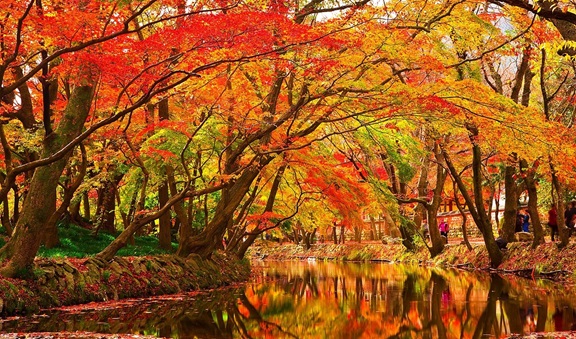.
Autumn
I find myself possessed among the red
(The maple) and the yellow (oak); possessed
Of some distinct yet subtle joy inbred
So deep within me, there so dear impressed
Its merest hint the whole world reinvests
With all the native goodness of that day
When its Creator, just before His rest,
Wound up His clock and gave Creation sway
With color, scent and sound and form to freely play.
And it’s the gaudiness, I sometimes think,
Of tree and bush so brash and harlequined
That brings my being giddy to the brink,
Or else the rusting air, the fitful winds
Have introduced some cool, undisciplined
Élan into the general atmosphere.
But no, my joy is not to color pinned,
Much less to wind. Its comfort is as dear
To me in grey November’s still and somber drear.
.
.
Jeffrey Essmann is an essayist and poet living in New York. His poetry has appeared in numerous magazines and literary journals, among them Agape Review, America Magazine, Dappled Things, the St. Austin Review, U.S. Catholic, Grand Little Things, Heart of Flesh Literary Journal, and various venues of the Benedictine monastery with which he is an oblate. He is editor of the Catholic Poetry Room page on the Integrated Catholic Life website.















Jeffrey, your enjoyment of autumn comes through beautifully and eloquently with inspired, not the least of which are the inclusions of “gaudiness” and “harlequined.” Autumn sings to me in your poem.
Your exuberant mood is so well-conveyed in phrases that practically dance with joy, as “When its Creator, just before His rest, / Wound up His clock and gave Creation sway. . . ” and in rhymes such as harlequinned / undisciplined. The reader can feel the poet’s “subtle joy inbred so deep within”, and at the same time is reminded that the magical effect of this giddiness has been experienced by so many who, over the centuries, have observed the excitement of autumn. It is such a popular poetic subject that it’s hard to do something new with it; but I think you have succeeded.
While giving a more than satisfactory sensory description in beautifully chosen words, Jeffrey, you end in a cloudy contrast that begs the question of why this deep, inbred, subtle joy of yours exists. The only answer is that it is NOT due to free play of the senses. But there are some suggestions about the “native goodness” of Creation, which is not experienced, but perhaps discovered through the Creator’s clock of the seasons.
A spiritually successful person is one who experiences an unvarying state of contentment and calmness in every situation. According to me, in this poem, Autumn and Winter, are suggestive of joy and sorrow. I also think this poem conveys the message that true joy is not an experience drawn from external things, but it’s a state of being—a spiritual stage that all monks strive to reach. You never fail to make me ponder the topics you choose, Mr. Essmann. Thank you for this. God bless you!
Jeffrey, thank you for putting into words some of the feelings I have in the
autumn season:
“. . . the fitful winds
Have introduced some cool, undisciplined
Élan into the general atmosphere.
But no, my joy is not to color pinned,
Much less to wind. Its comfort is as dear
To me in grey November’s still and somber drear.”
You describe my feelings on a cloudy November day.
Simply exquisite, Jeffrey. You have captured aspects of this striking season in words that splash color and sing of autumn’s splendor with a nod to our Creator who gives us a glimpse of heaven here on earth. I especially love the smooth musicality of language. This poem has me craving the gaudy glory of an English autumn. Thank you!